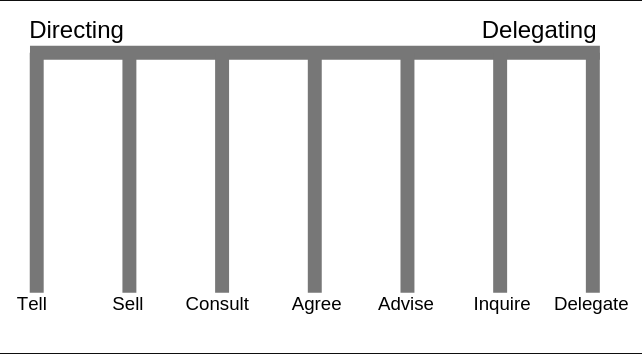How to Become a Master Delegator
I’ve worked with dozens of new managers over the years, and nearly every one of them has struggled with the same thing: delegation.
It’s tough enough to move from being an individual contributor to being a manager, but that difficulty is compounded once you realize that becoming a better leader means relinquishing control and trusting your people to make more decisions.
If you’ve recently moved into a management role, it will be crucial for you to develop the skill of delegation.
Delegation is not merely a tactic to minimize your personal workload; it is one of the most effective ways to develop your people and give them stretch assignments to grow and improve.
Although it’s natural to worry about burdening your team by giving them more work than they can handle, many new managers end up delegating too little, which makes it more difficult to focus on your most important new responsibilities.
You can often tell if you’re not delegating enough by evaluating what type of work you’re completing and how much you have on your plate.
For example, if you keep canceling meetings or postponing important projects, that’s a sign you’re taking on too much responsibility. If you find yourself doing 50 percent of your old job (e.g. helping write reports, answering phones, or completing cases in the team queue) on any given day rather than a more appropriate number like 10–20 percent, you may need to delegate more of those tasks to your team.
There are a number of reasons why you might struggle with delegating certain tasks:
- You think you can do it better yourself. Maybe you can, but at what cost? If someone else can do that task 80 percent as well as you can, maybe that is good enough.
- You don’t trust anyone else to do it. This could be a red flag that you haven’t developed capability within your team. Your job is to develop your people, so if there is truly no one else capable of doing a particular task, you should quickly work to develop your team’s competency in that area and ensure you’re not siloing knowledge.
- It’s easier to do it yourself. If explaining the task to someone else will take longer than completing it yourself, maybe it’s best to just do it yourself. But how often does this task arise? If this task needs to be done every week, month, etc., then teaching someone else how to do it and delegating it to that person will likely save time and make life easier in the long run. Plus, it will allow the other person to gain a new skill, which will help them progress in their career.
- You worry your employees are too busy. Everyone is busy, including you. Sometimes the only way for you to avoid long hours and burnout is to spread the love by delegating more work to others on the team. If you’re concerned your team members may have too much going on, you can always ask them what is on their plate and use that information to determine how much to delegate at that time.
- You aren’t sure what to delegate. There’s no formula for what to delegate, so try asking yourself a few questions to determine whether delegation is the right decision in a particular situation: Is this task or decision something I’m uniquely able to handle? Am I the only person who could do this or simply the best person who can do it? Is this task a core element of my job? Could a team member grow by taking on this opportunity?
Remember that the primary purpose of delegation is not to get rid of your own work but to develop your team and find opportunities for them to grow.While delegation is not always the correct thing to do, it is a useful skill to develop in order to distribute work, develop the skills of your team, break down silos of knowledge, and free yourself up for other strategic initiatives within the team and the company.
Effective delegation is a long-term investment in your team.
The 7 Levels of Delegation
In addition to specific tasks, you might also choose to delegate decisions. When you delegate a decision, you’re trusting someone else to make that decision on your behalf, or, at the very least, giving them an opportunity to suggest a solution you can discuss together.
Each business situation is slightly different. Some decisions are best made by you, while other decisions are best made by others on your team. Delegation is not always appropriate, and you may decide to delegate certain aspects of a project but not others.
For example, a Customer Support Team Lead may decide to delegate a project to collect customer service data but may want to be one of the key decision-makers for determining what action steps the team should take based upon the data collected.
Entrepreneur Jurgen Appelo developed an excellent model called The 7 Levels of Delegation that provides a framework for understanding delegation:
- Tell — You make the decision yourself. You may decide to explain your rationale to others.
- Sell — You decide which decision you think is best, then try to sell others on your idea.
- Consult — You ask for input before deciding and try to consider other people’s opinions in your decision.
- Agree — You discuss the decision with everyone and seek group consensus on what to do.
- Advise — You allow others to decide, but you offer an opinion for them to consider.
- Inquire — You let others decide but ask them to sell you on their decision afterward.
- Delegate — You leave the decision entirely up to someone else and tell them they don’t need to follow-up with you.

In order to figure out which level of delegation is appropriate in a given situation, ask yourself the following questions:
- How quickly do we need to move on this decision? When speed is of the essence, you’ll likely want to choose one of the “Directing” levels on the left-hand side of the graph. Too much discussion about who is responsible for what could slow the process down to the point where any action is no longer effective. For example, it may be best to choose “Telling” or “Selling” in situations where a client needs immediate assistance. On the other hand, if you’re trying to improve a department process, you might entrust someone on your team with the responsibility of figuring out what needs to be done and executing on whatever plan they determine is best. Whenever possible, allow others to have a stake in the decision-making process.
- How important is this decision and how many people will it impact? The greater the importance and impact of a decision, the more certain you want to be. You’ll likely want to choose an option toward the middle of the graph that incorporates many people’s ideas.
- Can one or two other people on the team learn something from making this decision? By picking an option on the right-hand side of the graph, you can give others a growth opportunity by letting them make the decision.
Regardless of how a decision is made, you want to fully own the decision and be accountable for it. That means that if you have delegated the decision to someone else, you will not throw them under the bus if their decision doesn’t work out. You are responsible for the decision.
How to Delegate Effectively
Delegation is a difficult skill to master. Here are a few tips to keep in mind when delegating:
- Identify the right person. Pick someone who can learn from the activity, yet still has the skills to accomplish the task.
- Define the what and the why, but delegate the how. Share the relevant background information so the team member knows why the task is important. No one wants to work on meaningless tasks or things they don’t understand. Explain what has to be accomplished and why it’s important, but let the team member decide how to do it.
“Never tell people how to do things. Tell them what to do and they will surprise you with their ingenuity.” -General George Patton
- Define what “done” looks like. Talk to the team member and decide upon a shared definition of what “done” looks like for this project. For example, when they’re done with the work, do they need to follow-up with you to let you know it’s finished or is it enough for them to mark it as done in your team workflow database? Ensure you and the team member agree on what exactly must be done.
- Clarify who owns what. Using the lens of “The 7 Levels of Delegation” model above, explain your expected level of involvement in the project. Do you want the team member to run their idea past you before they act? If so, tell them that. Setting expectations up front ensures that everyone is on the same page for what exactly you are delegating.
- Find the balance. If you delegate something and continue to stay heavily involved, the team member may feel like you don’t trust them. On the flipside, if you completely disconnect and never check in with the team member, they may view you as disengaged and unwilling to help. Ask the team member what you can do to support them and how they’d like you to be involved.
- Agree on a timeline. When should this project be completed? Is there an external date you need to meet from a client, partner, vendor, or employee?
- Determine project milestones. If the project is large and complex, it may be helpful to determine a few key milestones to track progress. Milestones help chunk the work into smaller tasks, but they can also give you a few agreed-upon touchpoints when you can check in with the team member without feeling like a micromanager.
Delegation is a skill that can simultaneously expand your capacity and develop your team’s capability.
Become an effective delegator and you’ll be impressed by the results.




